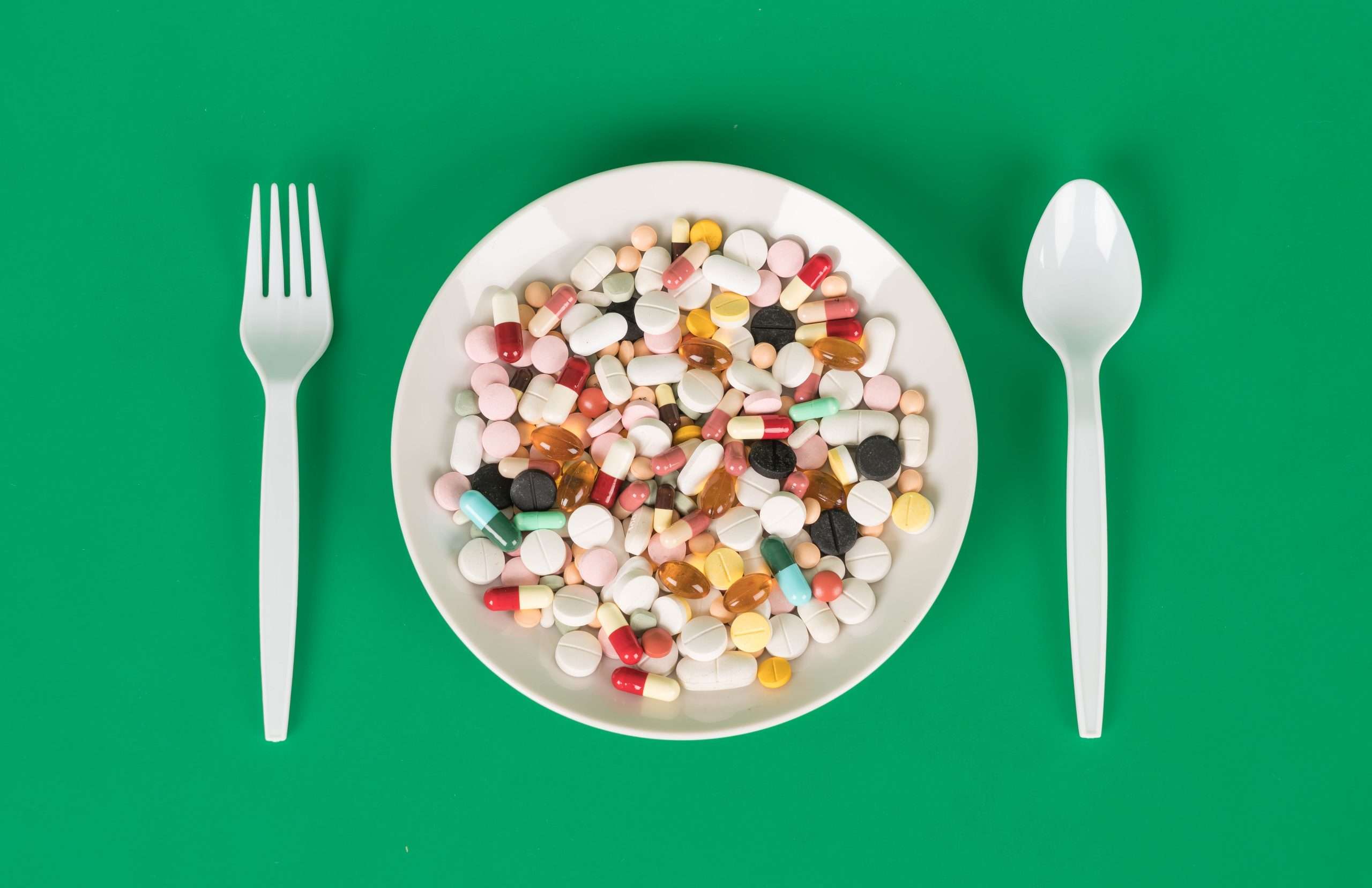

Medically reviewed by
Natalie Bessom, D.O. Board-certified family medicine doctor with specialty training in nutrition, USA
Learn which thyroid supporting supplements are recommended to support your thyroid function and why.
This article discusses:
- What are supplements?
- How are supplements regulated?
- What are some types of thyroid supporting supplements?
The thyroid is a small butterfly-shaped gland located at the base of the neck. The thyroid gland is part of the endocrine system which regulates the body’s hormones. The thyroid specifically is responsible for regulating the body’s metabolism, energy, weight, and much more. When the thyroid is not able to function properly, it can greatly affect your entire body.
There are key nutrients that drive your thyroid function and hormone production. Due to the fact that the thyroid is highly nutrient-dependent, a lack of a nutrient-dense diet may contribute to your thyroid disease, dysfunction, and/or symptoms.
While altering your diet will not treat or cure a thyroid disease – adding thyroid supporting supplements to your diet and treatment plan will help support your thyroid function and overall health.
What are supplements?
The word “supplements” can seem overwhelming as there is both a ton of information and a plethora of options available on the market these days. Many supplements are more of a hype than science-based, thus making it difficult to discern what to take, if any. Supplements are defined as a product taken that contains one or more ingredients (such as vitamins or amino acids) that are intended to supplement one’s diet and are not considered food.
How are supplements regulated?
Some questions you may be asking yourself are:
- What supplements do I take?
- How much do I take?
- How do I know if it’s the right supplement for me?
Do I even need a thyroid supporting supplement?

The FDA (Food and Drug Administration) regulates and monitors dietary ingredients and dietary supplements under a specific set of rules that differ from conventional everyday food, beverages, and drugs. This specific rule is called the Dietary Supplement Health and Education Act of 1994 (DSHEA).
Dietary ingredients that can be used in supplements or to supplement a diet include:
- Vitamins
- Minerals
- Amino acids
- Herbs or botanicals
Under DSHEA:
- Supplement manufacturers are prohibited from marketing dietary supplements that claim to treat, diagnose, cure, or alleviate the effects of diseases
- The FDA is responsible for monitoring the safety of these products after it reaches the market
- The FDA can remove any supplement off the market if they are found to be unsafe – however, this sometimes only takes place after the FDA receives complaints or a safety issue is even noticed.
To ensure that you are buying safe and effective products for your thyroid condition, always consult a health care professional. Inquire with your health care professional to:
- Inquire if you need to be taking certain supplements
- Ensure that the supplements will not interfere with any current medication or supplements you are taking
Some steps you can take yourself include:
- Purchasing supplements only from reputable brands that have a proven track record. You can find all this information by looking at their website, reading online reviews etc.
- Read the labels on your supplements – ensure that you are not getting too much (Upper Limit – UL) but instead, the Recommended Daily Allowance (RDA) but consulting this chart guideline.
What are some types of thyroid supporting supplements?
Vitamins
Vitamin A
Vitamin A, known as retinol, is essential for vision, reproductive functions, immune system, and cellular communication. Vitamin A can help reduce deficiencies in:
- Hair loss
- Dry eyes
- Susceptibility to infections
- Skin problems
Studies have also shown that Vitamin A can aid in making significant improvements to TSH levels proving it to be a great thyroid supporting supplement.
Some great food sources of Vitamin A include:
- Beef liver
- Sweet potato (cooked)
- Kale
- Carrot
- Mango
Vitamin B12
Anemia is a vitamin B12 deficiency and is commonly found in patients with hypothyroidism – almost 20-60% of hypothyroid patients. Vitamin B12 is essential for your body’s function, but unfortunately, it is something that your body cannot produce naturally. Vitamin B12 plays a vital role in many of your bodily functions including:
- The proper functioning of your nerve cells
- Red blood cell formation
- DNA synthesis
Furthermore, B12 is able to help boost your energy, improve your memory, help prevent heart disease, and benefit your hair, skin, and nails.
Patients that suffer from hypothyroidism or anemia often experience symptoms of brain fog, fatigue, dry skin, and hair loss. Adding a thyroid supporting supplement like vitamin B12 can help offset these symptoms.
Some food sources of Vitamin B12 include:
- Animal liver and kidneys
- Clams
- Fortified non-dairy milk
Minerals
Iodine
The thyroid requires iodine to produce thyroid hormones. Simply put, if you do not have enough iodine in your body, you cannot make thyroid hormones. The body is unable to produce iodine itself, so it all has to come from your diet.
An excess amount of iodine can cause thyroid problems such a hypothyroidism, hyperthyroidism, and enlarged thyroid. It is very important to consult your healthcare provider to determine if you even need an iodine supplement.
Most individuals are able to get enough iodine through their diet alone and do not need to take an additional supplement.
Food sources of iodine include:
Selenium
Selenium is an important mineral that helps your body function properly, including reproduction, metabolism, and fighting infections. Your thyroid houses more selenium than any other organ in the body. Selenium is a critical component in a healthy thyroid function as it regulates the hormones produced.
Foods that are a great source of Selenium include:
- Brazil nuts
- Seafood
- Lean meat
- Rice
Magnesium
Magnesium plays a critical role in helping our bones, regulating blood pressure, nerve transmission, disease prevention, and overall health. Magnesium is also important for thyroid hormone production and for the conversion of T4 to T3. (hyperlink) This thyroid supporting supplement is needed for not only your thyroid but overall body function.
Some healthy foods that contain magnesium include:
- Dark chocolate
- Avocados
- Tofu
Probiotics
Probiotics are good bacteria that exist in the gut. The benefits of probiotics include enhanced digestive health and strengthened immune function. Some examples of probiotic-rich foods include:
- Kefir
- Yogurt
- Kimchi
Probiotics are often recommended for those with an autoimmune disease like hypothyroidism. Leaky gut is a symptom of autoimmune thyroid disease and is caused by an imbalance of good and bad bacteria in the gut.
Key Takeaways
- Supplements are defined as a product taken that contains one or more ingredients (such as vitamins or amino acids) that are intended to supplement one’s diet and are not considered food
- The FDA regulates and monitors supplements once they hit the market
- Always consult a healthcare professional before adding supplements to your diet to ensure they do not interfere with any current medication, supplements, or treatments you are taking
- Thyroid supporting supplements can benefit overall health and thyroid function
- There are an array of thyroid supporting supplements that are vitamins, minerals, and probiotics
If you want to better manage your medications and supplements, symptoms, moods, energy levels, and weight changes, download our ThyForLife app to get a head start! ThyForLife is an all-in-one thyroid solution right at your fingertips.
Here at ThyForLife, we do our utmost to provide accurate information. If you require more detailed information regarding medical terms, please consult your thyroid doctor.
FAQs
Thyroid-supporting supplements are dietary supplements containing nutrients crucial for thyroid health, such as iodine, selenium, vitamin D, and zinc. These supplements are important because they help support thyroid function and hormone production, potentially alleviating symptoms associated with thyroid disorders like hypothyroidism.
These supplements provide essential nutrients that may be lacking in the diet or insufficiently absorbed by the body, particularly in individuals with thyroid disorders. For example, iodine supports thyroid hormone synthesis, selenium helps regulate thyroid function, and vitamin D plays a role in immune function and inflammation reduction, all of which are vital for managing thyroid conditions.
While these supplements offer support for thyroid health, they are not typically used as standalone treatments for thyroid disorders. Instead, they are often incorporated into a comprehensive treatment plan that may include medications prescribed by healthcare professionals, dietary changes, and lifestyle modifications. It’s essential to consult with a healthcare provider before starting any supplement regimen, especially if you have an existing thyroid condition or are taking medications.
Individuals should be cautious about the dosage and potential interactions with other medications or supplements. For instance, excessive iodine intake can have adverse effects, and selenium supplementation should be within recommended limits. It’s essential to follow dosage recommendations and consult with a healthcare provider if you have any underlying health conditions or concerns about potential interactions.



